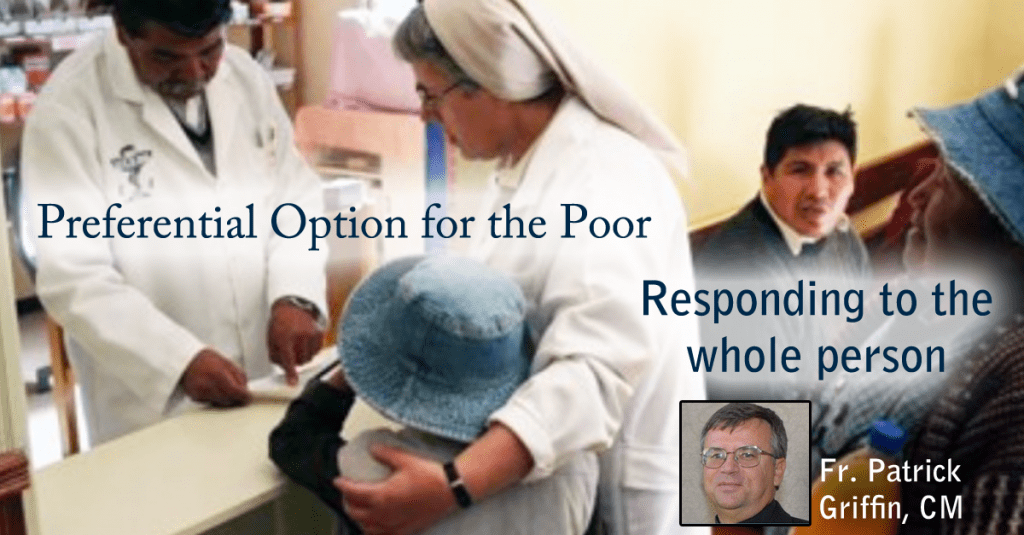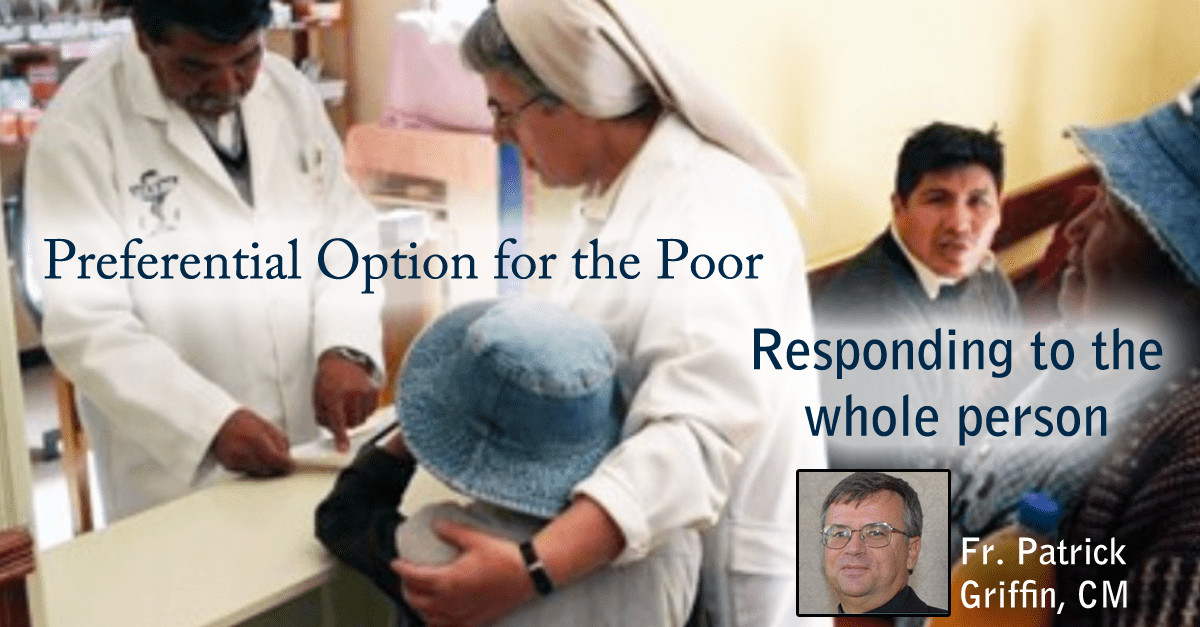Laudato Si and the “Preferential Option for the Poor”
 “Preferential Option for the Poor” is the latest reflection by Fr. Pat Griffin in his series Considering Consecrated Life
“Preferential Option for the Poor” is the latest reflection by Fr. Pat Griffin in his series Considering Consecrated Life
Laudato Si’ has justifiably gotten a lot of attention. The emphasis in this document concerning the physical suffering of the poor because of the lack of care for the environment stands out on every page. Perhaps that particular focus can cause another passage of Pope Francis to come to mind by way of complement. This time, we look to Evangelii Gaudium:
“Since this Exhortation is addressed to members of the Catholic Church, I want to say, with regret, that the worst discrimination which the poor suffer is the lack of spiritual care. The great majority of the poor have a special openness to the faith; they need God and we must not fail to offer them his friendship, his blessing, his word, the celebration of the sacraments and a journey of growth and maturity in the faith. Our preferential option for the poor must mainly translate into a privileged and preferential religious care.” (Francis, Evangelii Gaudium, 200)
The balance which Francis presents between physical and spiritual care of the poor is striking. It also sounds a very Vincentian note. Vincent insisted on caring for the whole person!
In many places Vincent draws our attention to the union of these concerns. Sometimes, he speaks about the lack of balance which can result when we rank the spiritual over the physical care. One famous passage addressed to the confreres stands out:
So then, if there are any among us who think they’re in the Mission to evangelize poor people but not to alleviate their sufferings, to take care of their spiritual needs but not their temporal ones, I reply that we have to help them and have them assisted in every way, by us and by others, if we want to hear those pleasing words of the Sovereign Judge of the living and the dead, “Come, beloved of my Father; possess the kingdom that has been prepared for you, because I was hungry and you gave me to eat. . . .” (VdP, CCD 12:195, p. 77; see also CCD 8:3077, p. 277)
Vincent was concerned that his followers would place their emphasis so strongly on the matters of the soul that they would neglect the demands of the body. It suggests to me the opposite of what may happen in our lives. For me, and perhaps for you, when we speak about the poor, our thinking and descriptions usually go immediately to their material impoverishment.
But Vincent also gave special emphasis to the spiritual when the situation warranted that wake-up call. In one recommendation given at Chapter, he urges that “we [should] to run to the spiritual needs of our neighbor as if we were running to a fire” (VdP, CCD 11:17, p. 25). In another context, he writes regarding the ministry of the nascent Daughters of Charity:
“What is still more noteworthy in the work of these poor girls is that, besides the corporal services they render to the sick poor, they try to contribute to their spiritual welfare.” (VdP, CCD 2:773, p. 602)
And Louise will not be excluded from this instruction to her Sisters:
“Do as much good for the poor as you can, and I would ask this especially with regard to the spiritual service you owe them.” (LdM, SW, L432, p. 245)
The central emphasis on spiritual service of those who are poor has two prongs. First of all, it refers to the way in which one provides for the needs of the marginalized through the sacraments, preaching, religious education and counseling. These brothers and sisters must be welcomed and served as members of the Body of Christ. Concern for this aspect of their lives and their eternal salvation should spur the Vincentian Family into attentiveness and action.
Secondly, spiritual service can refer to the way in which the physical ministry is carried out. God’s love should find expression in the compassion, generosity and respect with which we carry out our services. The human dignity of the each child of God needs a reverent attitude. It is not enough to send money and resources! Our efforts demand personal involvement. And we have the responsibility to remember the poor and their stories in our prayer. Vincent reflects:
“‘Wretched man, have you earned the bread you’re about to eat, that bread that comes to you from the labor of the poor?’ If we don’t earn it like them, at least let’s pray for their needs. . . . We’re like Moses and must continually raise our hands to heaven for them.” (VdP, CCD 11:125, pp. 190-191)
Should there be a Vincentian celebration/prayer which does not remember and lift up the needs of the poor? We must assume that the Almighty hears our cries on their behalf when they are too weary or discouraged to cry out on their own.
Francis said that our “preferential option” should translate into “a privileged and preferential religious care” for the poor among us. One response in the effort of a Vincentian cannot be exercised at the expense of the other. As Vincent and Louise, we, too, respond to the whole person.







0 Comments